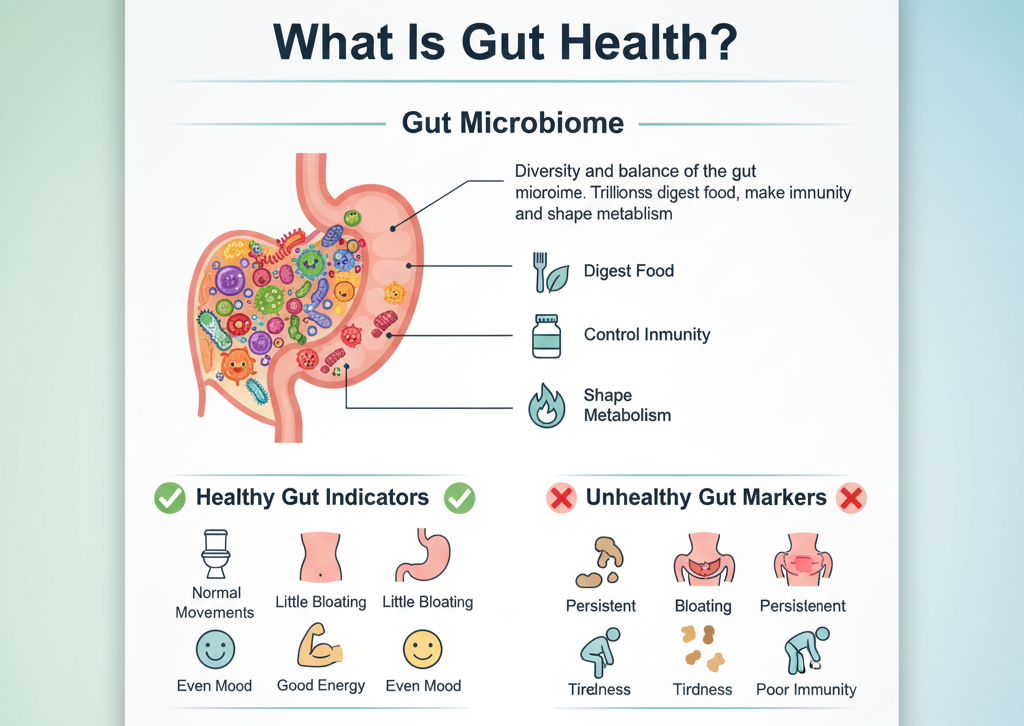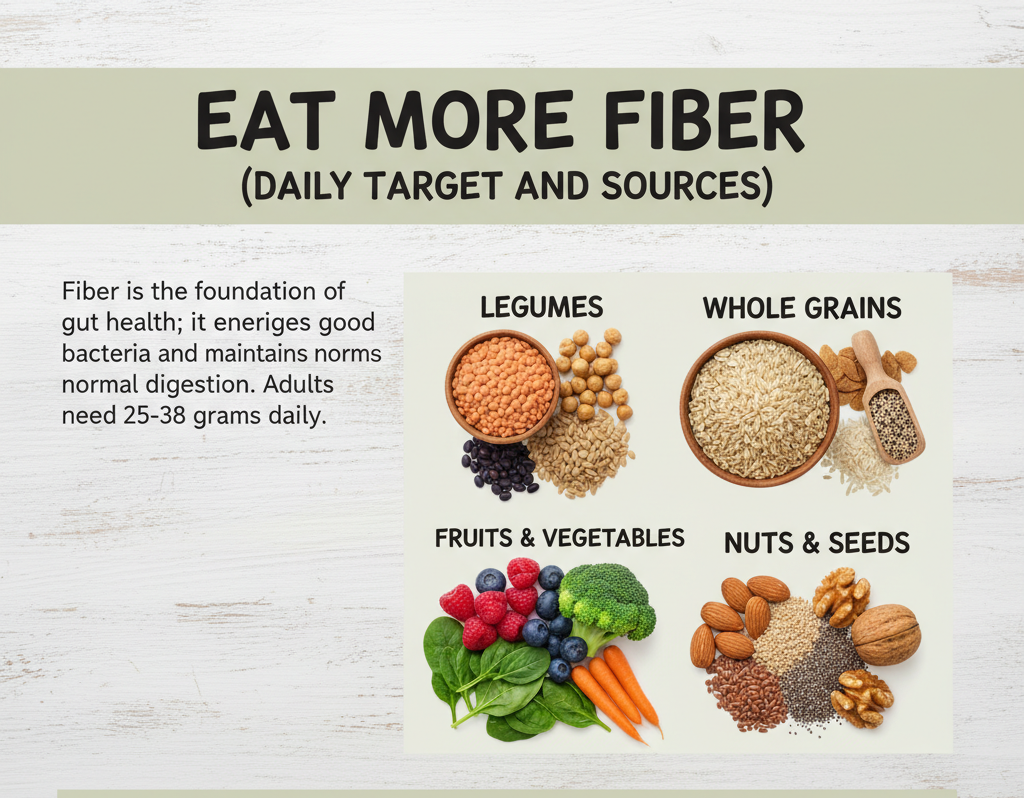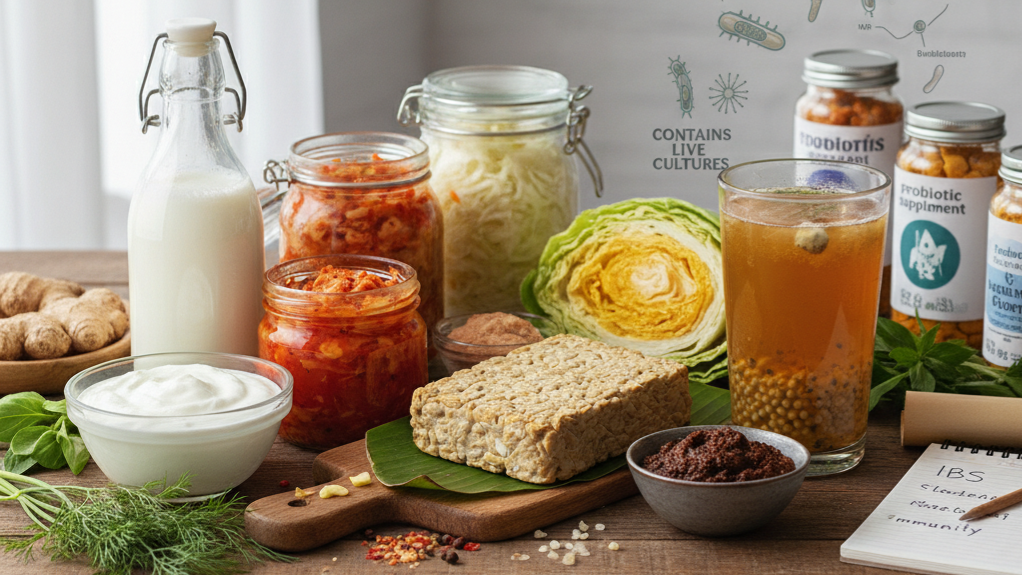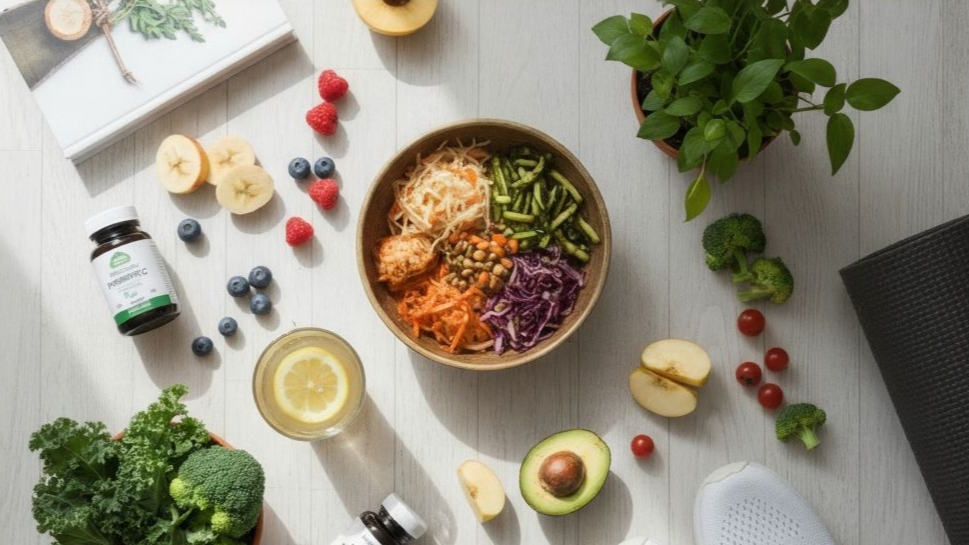Your gut is more than an organ that digests food; it’s a central hub that affects digestion, immunity, mood, and metabolism. An efficient gut can rev up energy, stabilize mood, and support general health, whereas an out-of-balance gut can cause bloating, fatigue, or recurring illness.
In this guide, we’ll explore how to improve gut health naturally through simple, sustainable lifestyle changes.
You’ll learn food-first strategies, daily routines, and practical tips to nurture your gut microbiome, along with signs that it may be time to seek professional help.
Table of Contents
ToggleWhat Is Gut Health?
Gut health is the diversity and balance of the gut microbiome, composed of trillions of microbes that reside in your gut. These microbes digest food, make vitamins, control immunity, and shape metabolism.
Indicators of a healthy gut: normal bowel movements, little bloating, good energy, and even mood.
Markers of an unhealthy gut: persistent bloating, abnormal stools, tiredness, poor immunity, or recurrent food sensitivities.

The gut–brain axis is also involved; stress, not sleeping well, or anxiety can interfere with digestion and microbiotic balance. Maintaining gut health, in short, involves taking care of body and mind.
Core Principles for Healthy Gut
At Uncoded, we stress that long-term habits are more important than fads. Some key guiding principles are
- Fiber and plant diversity: More plant variety = more microbial diversity.
- Whole foods vs ultra-processed foods: Avoid additives, added sugars, and bad fats.
- Consistency beats intensity: Sustainable small changes work better than all-or-nothing diets.
Eat More Fiber (Daily Target and Sources)
Fiber is the foundation of gut health; it energizes good bacteria and maintains normal digestion. Adults need 25–38 grams daily.
Superstar sources are:
- Legumes: Lentils, chickpeas, and black beans.
- Whole grains: Oats, brown rice, and quinoa.
- Fruits & vegetables: Berries, leafy greens, broccoli, and carrots.
- Nuts & seeds: almonds, chia, flaxseeds, and walnuts.

Practical advice: add a tablespoon of chia seeds to breakfast, switch from white bread to whole grain, or have a side of beans with lunch. These little actions are the cornerstone of how to maintain a healthy gut on a daily basis.
Diversify Your Plants Every Week
Rather than thinking in terms of “perfect” meals, try to eat 30+ varied plants every week. This “eat the rainbow” approach guarantees your gut microbes an extensive variety of nutrients.
Foods high in polyphenols (bright-colored fruit and vegetables, herbs, spices, tea, coffee, and cocoa) nourish beneficial bacteria.
Change vegetables every week; substitute spinach with kale, apples with pears, or introduce herbs such as parsley and coriander for a mix-up.
Variety, not limitation, is the real key to the advantages of a healthy gut microbiome.
Prebiotics and Resistant Starch
Prebiotics are selectively feeding fibers for beneficial microbes.
Best prebiotic foods: Onions, garlic, leeks, asparagus, bananas, oats, legumes, pistachios, and cashews.
Resistant starch, another fiber friendly to the gut, is created when some foods are cooked and then cooled. Some examples include cooled rice, green bananas, and cooked-and-cooled potatoes. These can be added to salads or snacks with ease.
Fermented Foods and Probiotics
Fermented foods are a natural source of probiotics that increase microbial diversity. Add the following foods:
- Yogurt and kefir.
- Sauerkraut and kimchi.
- Tempeh, miso, and kombucha.
Tip: Not all live cultures occur in fermented foods. Check for labels with the words “contains live cultures” or the name of certain bacterial strains. Probiotic supplements may be useful in certain situations, but choose strains appropriate to your needs (e.g., IBS, immunity).

Hydration for Motility and Digestion
Water is essential to effortless digestion and preventing constipation.
Daily pointers:
- Start the day off with a glass of water.
- Drink liquids in between breaks instead of drinking huge amounts at once.
- Add electrolyte-containing liquids in hot or exercise situations.
- Warm beverages like tea can induce gentle bowel action.
- Hydration is a simple but underrated way to promote natural gut health.
Smart Meal Habits and Mindful Eating
The way you eat is as crucial as the food you eat.
- Eat slowly and chew well to minimize bloating.
- Maintain regular meal times to support gut rhythm.
- Have moderate portions to avoid discomfort.
- Should symptoms persist, employ a gentle food log to find triggers (without extreme restriction).
Move Your Body, Support Your Gut
Movement aids digestion and microbial diversity.
- Strive for 150 minutes a week of moderate exercise (cycling, yoga, walking).
- Attempt brief post-meal walks to help motility.
- Include gentle core exercises to enhance digestive comfort.
In cases of sensitive digestion, low-impact exercises such as swimming, stretching, or tai chi can also prove to be useful.
Sleep, Stress, and the Gut–Brain Axis
Sleep disturbances and chronic stress are among the leading causes of symptoms of an unhealthy gut.
- Improved sleep routines: Establish a regular routine, have a cool dark bedroom, and restrict screen time at night.
- Stress management techniques: Meditation, yoga, writing in a journal, walking in nature, or simply mindful breathing for a few minutes each day.

Assisting mental health is an important aspect of how to maintain a healthy gut in the long term.
Also Read : How the Gut Microbiome Affects Mental Health: Digestive to Depression
Restrict Ultra-Processed Foods and Irritants
Ultra-processed foods upset gut balance with added sugars, preservatives, and refined oils.
- Select whole grains instead of refined.
- Munch on nuts or fruit rather than prepackaged chips.
- Prepare sauces homemade rather than using bottles.
Keep irritants to a minimum, such as excessive alcohol, extremely high-fat fried foods, and smoking. Moderation is the way.
Special Considerations and When to Get Help
In most individuals, lifestyle modifications are beneficial. Some symptoms, however, cannot be overlooked:
- Weight loss, blood in stool, chronic pain, and fever.
- IBS, IBD, celiac disease, or SIBO needs specific management.
- Certain medications like antibiotics will interfere with the microbiome; aid healing with fiber and fermented foods.
Always consult a physician if symptoms worsen or do not go away.
Final Thoughts
The way to improved gut well-being has nothing to do with costly supplements or fad diets. Rather, it’s all about small, consistent steps: added fiber, varied plants, fermented foods, regular exercise, balance in stress, and good sleep.
Implementing these Uncoded strategies will reveal the long-term advantages of a well-functioning gut microbiome: improved digestion, robust immunity, increased energy, and enhanced well-being.

